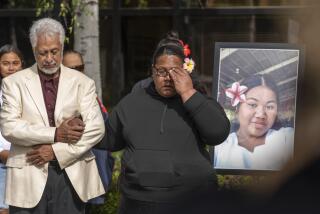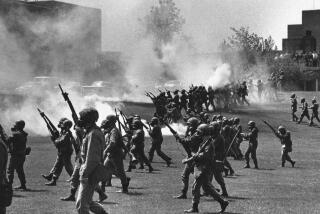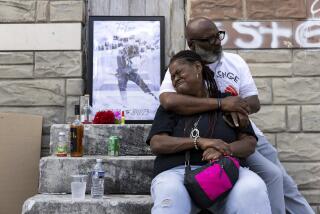Oakland slayings tear apart a tightknit student community
For eight months, they studied shoulder to shoulder in a stripped-down classroom with cream-colored walls while planes roared overhead, heading to and from the airport next door.
There was a mother of three, and a young woman still living with her parents. A part-time waitress and a part-time mental health counselor, a former lawyer and a former grocery stock boy. One came after years of working for the Tibetan government in exile, another left behind war-torn Afghanistan.
They were the latest class at Oikos University’s 4-year-old nursing school, all drawn to the same promise: one year of hard work, and they could become vocational nurses, with solid paychecks and guaranteed positions in a field with constant demand. It was a promise that spoke to immigrants, recent or second-generation, looking for a mid-life career change or to launch their first.
As the end of their training approached, they studied something all nurses must grapple with on the job — death and dying. On Monday, two months shy of graduation, as they sat down to take a test, they would come face to face with the reality all too painfully and prematurely.
That was the day a former classmate, One L. Goh, 43, burst into their classroom waving a gun. According to police and witnesses, he took a secretary hostage and ordered students to line up in a row, then opened fire. He was angry over a tuition refund, police said. Seven people died; three others were wounded.
The mass killing shocked the city but took a far greater toll on the tightknit school in an industrial complex next to a Swedish spa and food bank, in the flight path of nearby Oakland International Airport. In the shadow of famed Bay Area schools such as UC Berkeley and Stanford University, Oikos University was largely anonymous except among the immigrants who came knocking on its door.
They converged from different parts of the world — 18 countries, the school’s founder once said — but shared the same dream, and Oikos was their launch pad.
“It was a very small class, so they were like family,” said Efanye Chibuko, whose wife, Doris, was among those killed. “They would all have lunch together, all study together.”
The 40-year-old mother, who left behind a career as a lawyer in her native Nigeria to be with her children and their father in San Leandro, had plans to get a master’s degree in law once she had her vocational nursing license. She eventually wanted to work in medical law to provide for her three young children, ages 3, 5 and 8.
In Oikos’ accelerated program, she became very close to the fellow students with whom she spent many of her waking hours, her husband said. It was a grueling schedule, but her husband said she took pride in learning — and even more so when she was elected president of her class.
In the days since the shooting, portraits emerged of others who were killed, many with similar tales. There was a tax analyst who, at 53, after she was laid off, went back to school to study nursing. There was a 21-year-old who dreamed of eventually becoming a doctor, carrying the hopes of her proud immigrant father.
“For 35 years after I came to the U.S., I lived to raise my daughter as someone who would serve society, and that dream has been shattered,” an Oikos administrator, at a memorial, quoted the father as saying. “I can’t understand.”
For Doris Chibuko, the only thing clouding her experience at Oikos was Goh, who left the school last year but returned a few months ago, causing a scene. The man “lost it” to students and staff at the school, Efanye Chibuko recalled his wife saying.
Like many of the other students, Goh had also arrived at Oikos looking for a fresh start.
He arrived from the East Coast after a failed marriage and a foiled attempt at starting a construction business. He didn’t fare much better in his first years in the Bay Area. A few months into his first job making sales and deliveries for a small San Mateo company, the CEO got word that Goh was getting into arguments with clients and called him into the office.
“He worked hard, but he had problems interacting with people,” said the executive, who asked that his name not be used because he did not want to be associated with Goh. “He was stubborn and wouldn’t change his ways.... I told him he wasn’t a good fit, and we parted ways.”
Goh next worked stocking produce at a Korean supermarket but abruptly quit less than a year later after squabbling with fellow workers there.
About a year ago, the former boss from San Mateo ran into Goh at an Oakland supermarket. Goh was about to start nursing school and excitedly talked about what the vocational nursing license would do for his job prospects and life.
“He seemed eager and upbeat,” the CEO said. “I thought it was impressive, going to school at his age, in his 40s.”
Yet his time at the school was also short-lived, and he voluntarily left the school last November, according to police.
Oikos was founded in 2004 as a divinity school with three students by Jongin Kim, a pastor who himself immigrated from South Korea with his wife, a registered nurse. In the years that followed, the school expanded to offer classes in an eclectic selection of fields — music, Asian medicine and English as a Second Language.
In 2008, the school launched a nursing program, holding well-attended information sessions at which students were told of exciting prospects. It was shorter and cheaper than programs for vocational nurses elsewhere, school officials said at the time.
Even so, the school was raising red flags in the eyes of state regulators. In the first two years, the school’s passing rates for national licensing exams were 58% and 41%, far below the state average of 75% and below the required 65%. In March, Jungoak Cha, the nursing school’s founding dean, filed a lawsuit against the school, saying she was owed $75,000 in salary and for a personal loan she gave the university.
Earlier this year, in the same class where Goh allegedly went on his shooting rampage, a certified nursing assistant specializing in hospice care came in to talk to the class.
When she finished her half-hour lecture on the end of life, hands went up, recalled Barbara, the guest speaker, who asked that her last name not be used out of privacy concerns.
“They had a lot of questions when it comes to death and dying because it’s a mystery to them,” she said.
She told them what she had learned through experience: “If you’re not accepting of it, then you can’t do the job.”
More to Read
Sign up for Essential California
The most important California stories and recommendations in your inbox every morning.
You may occasionally receive promotional content from the Los Angeles Times.











